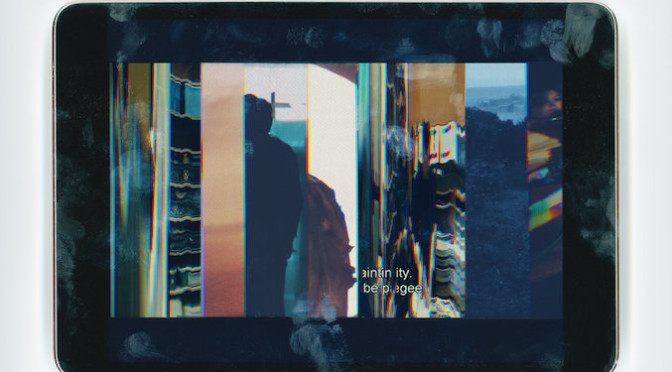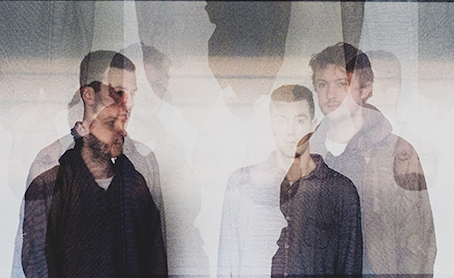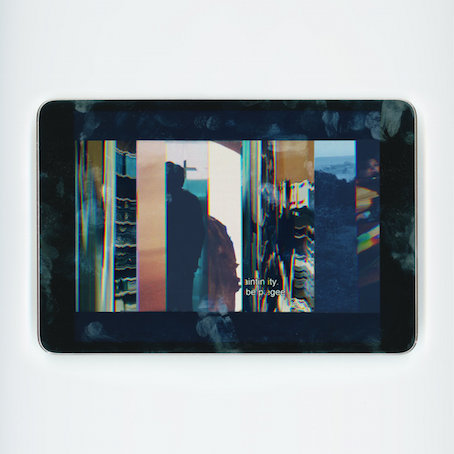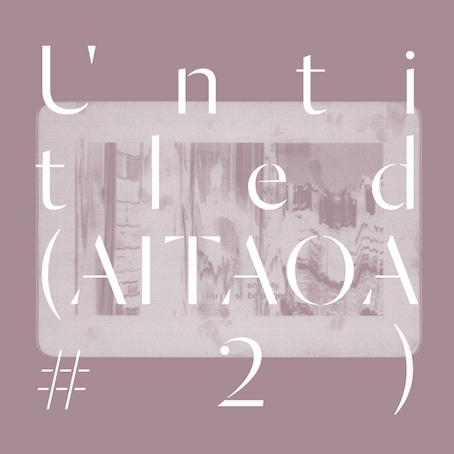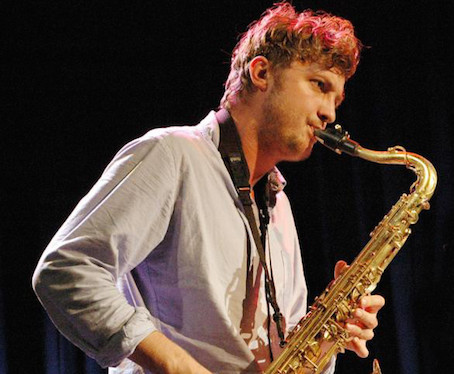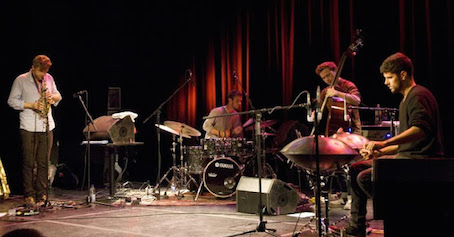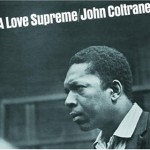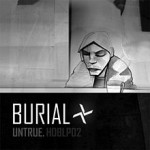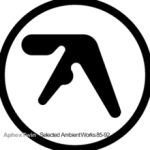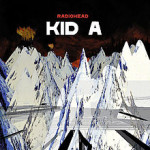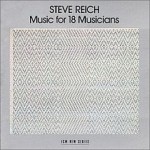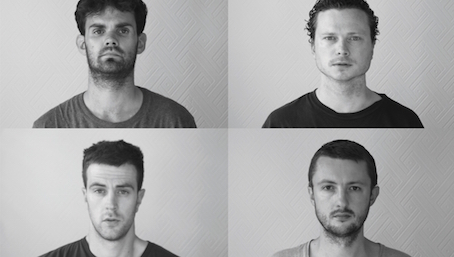EXCLUSIVE: INTERVIEW WITH JACK WYLLIE OF PORTICO QUARTET !!
With The Dreamy, Hypnotic Sound Of The Hang, Portico Quartet Creates Incredible Art In The Age Of UK New Jazz !!
DISC REVIEW “ART IN THE AGE OF AUTOMATION” “UNTITLED (AITAOA #2)”
エレクトロニカとバンドサウンドをシームレスに連結する UK ジャズ新世代 PORTICO QUARTET が、オートメーションの時代に贈る流麗なる記念碑 “Art in the Age of Automation” “Untitled (AITAOA #2)” をリリースしました!!2018年、人と機械の創造性が織り成す距離感は想像以上に接近しています。
エレクトロニカをベースとしつつ、全てにおいて細部までオーガニックであることに拘った GOGO PENGUIN の最新作 “A Humdrum Star” はリスナーの記憶に新しいところでしょう。
”Outer” をデジタルな世界、“Inner” をエモーショナルなヒューマンの領域に位置づけた作品は、例えるならば PC で精密にデザインされた建築物を、匠の手作業で一つ一つ忠実に再現して行くようなプロセスでした。
そして興味深いことに、同じ UK ジャズの新たな潮流から台頭した PORTICO QUARTET の最新作も相似的アイデアを提示して、人と機械が潮解した最先端のサウンドを立証しているのです。
「このアルバムはある種の解決策を提示しているんだよ。オートメーションと人間らしさという2つの異なる物事についてのね。」Jack がインタビューで語った通り、”Art in the Age of Automation” そして “AITAOA #2” がモダンミュージックが宿す苦悩にある種の解決策をもたらすことは明らかです。
“エモーション= 人間” “精密 = デジタル” という刷り込み。言い換えればその苦悩は固定観念という人の持つカルマ。そしてそのカルマに真っ向から挑んだ作品こそ “Art in the Age of Automation” だと言えるでしょう。
Jack は PORTICO QUARTET の音楽性をこう表現しています。「僕たちのサウンドには様々な音楽の側面が落とし込まれているよ。ジャズ、エレクトロニカ、アンビエント。時にはミニマリズムだって垣間見える。」Ninja Tune へ移籍しジャズとの距離を取り PORTICO の名の下でリリースしたポップな異色作 “Living Fields” を経ることで、ある種 “回帰” にも思える “Art in the Age of Automation” はデビュー以来最も深みを増しています。
アルバムオープナー “Endless” はその回帰と深みの象徴かも知れませんね。残響を帯びた電子音、嫋やかなブレイクビート、エセリアルなエレクトロニカの流れは、バンドのトレードマークであるハングドラムの風雅な響きを呼び込みます。”Portico” (前廊)を経由して辿り着くは神聖なるサクスフォンの嘶き。
ヒューマンとデジタルの境目が不可解な、カルマを凌駕した UK らしいダークな情緒はポストロックの雄大さを伴ってリスナーにエンドレスなサウンドスケープを届けるのです。
一方で、タイトルトラック “Art in the Age of Automation” を聴けば、独特の倍音を備えた音階をもつ打楽器ハングドラムが、ジャズとミニマリズムの蜜月を育み幻想的な電子の世界を映し出していることに気づくはずです。20世紀最後にして最大のアコースティック楽器発明、スティールパンのアップデートバージョンは、コンテンポラリーなデジタルの海にも良く映えます。
実際、アルバムを聴き進めるにしたがって、オーガニックな演奏とデジタルなマニュピレーションの境界は、英国の霧で覆われたかのように混迷を深めていきます。”A Luminas Beam” や “KGB” で見せる、生々しい楽器の音色と電子音の融合が育む浮遊感やダイナミズムは、変則拍子を身に纏いジャズとロックの境界さえ霞ませるその深き “霧” のたまものだといえるでしょう。
“Current History” でクラシカルとミニマルテクノの真髄を披露した後、辿り着く “Lines Glow” はまさに音のユーフォリア。神々しきハングの音色はトライバルな感覚をも伴って、カラフルなシンセサイザーの海へと溶け込みます。そうして育まれたサウンドスケープの種は “Undercurrent” で静謐と叙情の波を全身に浴びて終幕に相応しくヒプノティックに開花するのです。
壮麗なストリングスを含むアコースティックな楽器、オーガニックな演奏がモダンなプロダクション、テクニック、テクノロジーと融和した時、そこには鮮やかな PORTICO QUARTET の色彩が生まれます。PORTICO QUARTET の固定観念を解放するチャレンジは、”デジタルなエモーション”、”精密な演奏技術” を幾重にもレイヤーして最新作 “Untitled (AITAOA #2)” へと引き継がれているのです。
今回弊誌では、サクスフォン /キーボードプレイヤーの Jack Wyllie にインタビューを行うことが出来ました。PORTICO QUARTET、GOGO PENGUIN 両者共に、UK ジャズの特異性、革新性についても非常に近い切り口で回答していますね。注目です。どうぞ!!
PORTICO QUARTET “ART IN THE AGE OF AUTOMATION” “UNTITLED (AITAOA #2) : 9.9/10
INTERVIEW WITH JACK WYLLIE
Q1: This is the first interview with you. So, could you tell us about yourself and band itself? What kind of music were you listening to, when you were growing up?
【JACK】: I’m jack, I play the saxophone and some synths / keys and electronics occasionally. The band is made up of Duncan the drummer and Milo who plays bass and keir who plays keys and hang drum.
When I was growing up I listened to a lot of music. I was quite into British Indie bands in the 90’s, like Ocean colour scene and blur, they have almost no connection to our music now but were important to me when I was a teenager. I was also listening to bands like cinematic orchestra and jagga Jazzist, along with more classic jazz artist like John Coltrane and miles Davis. Then when I was in my 20’s I got into minimalist music and have been into that ever since, its something we keep on mining. These days I have a very broad taste in music but I’ve been into Japanese ambient music for the last few years, people like Hiroshi Yoshiumura and Susumu Yokota.
Q1: 本誌初登場です!まずはあなたの音楽的なバックグラウンドから聞かせていただけますか?
【JACK】: 僕は Jack。サックスと、時々キーボードやシンセサイザーをプレイしているよ。PORTICO QUARTET はドラマーの Duncan、ベーシストの Milo、キーボードとハングドラムをプレイする Keir、そして僕で構成されているんだ。
僕は膨大で様々な音楽を聴いて育ったね。90年代には UK のインディーズにハマっていたよ。OCEAN COLOUR SCENE や BLUR のようなバンドさ。彼らは今の僕たちの音楽とはほとんど繋がりがないけれど、ティーンエイジャーの僕には重要な存在だったんだ。
John Coltrane, Miles Davis といったクラッシックジャズの巨人と並んで、CINEMATIC ORCHESTRA や JAGA JAZZIST のようなバンドも聴いていたね。
それから20代に差し掛かると、僕はミニマルミュージックにのめり込んだんだ。今までで最もハマった音楽だと言えるだろうね。
最近は幅広く音楽を聴いているよ。ただ、ここ何年かは日本のアンビエントミュージックにもハマっていてね。吉村弘や横田進といった人たちのようなね。
Q2: What inspired you to start playing instruments? Who was your musical hero at that time?
【JACK】: I started playing flute when I was about 11 years old. I wouldn’t say it was inspired by anyone in particular. In the UK most children would play the recorder from the ages of about 6-10 then you could go on to take up another instrument. I enjoyed the recorder, more just in the act of playing an instrument than any particular kind of music and I liked the sound of the flute so I played that after I had some experience on the recorder (they are very similar instruments). When was 12 I started playing the guitar because that was the kind of music I was into at the time, i was particularly fond of Jimi Hendrix. When I was about 13/14 I got more into jazz and started playing the saxophone.
Q2: あなたはサクスフォンやキーボードを自在に操るハイレベルなマルチプレイヤーですが、どのような楽器遍歴を持つのでしょうか?
【JACK】: 11歳くらいの時にフルートを始めたんだ。特に誰かに言われて始めたという訳ではなかったね。UK ではほとんどの子供が6歳から10歳くらいまでリコーダーをプレイして、それから他の楽器を始めるんだよ。
僕はリコーダーを演奏するのが好きだったな。特に決まったジャンルを演奏する訳ではなかったけど、演奏するという行為自体がね。フルートのサウンドも気に入っていたよ。だからリコーダーで経験を積んだ後フルートを選んだんだ。その2つはとても似た楽器だからね。
12歳の時に、ギターもプレイし始めたんだ。当時ハマっていた音楽に影響されてね。特に Jimi Hendrix は大好きだったよ。13か14の頃によりジャズにのめり込んで、サックスを始めたんだ。
Q3: How did the band come to be? Hang drum is one of the symbol of Portico Quartet. What made you use the modern instrument in your music?
【JACK】: Duncan found the hang at a world music festival in 2004. It had only just been invented and he bought one as soon as he heard it. His friend Nick Mulvey (ex member) then went on to buy on too. I met nick at university when we were both studying at The School of Oriental and African Studies, we started jamming together with saxophone and hangs, then I invited my friend Milo (bass) along and Nick invited Duncan and we just started jamming together. Then we started doing a lot of busking and making our own CD’s.
Q3: ハングドラムという特殊でモダンな楽器を取り入れたバンドを立ち上げたのはなぜですか?
【JACK】: Duncan が2004年のワールドミュージックフェスティバルでハングドラムを見つけたんだ。ハングは当時まだ開発されたばかりだったんだけど、音を聴くやいなや彼はすぐに一つ購入したんだよ。その後、彼の友達で元メンバーの Nick Mulvey が同じものを買いに行ったんだ。
僕は大学で Nick が会ったんだ。僕たち二人はオリエンタル/アフリカ学を学んでいたからね。それでサックスとハングでジャムり始めたんだ。それから僕は友人のベーシスト Milo を誘い、Nick は Duncan を誘って一緒にプレイし始めたんだよ。そうやって沢山のライブや CDの制作を始めたのさ。
Q4: OK, so let’s talk about your recent works. In 2014, you release “Living Fields” album under the name Portico. You radically changed your musical style to experimental electronic pop at that time. What was the reason of change of direction?
【JACK】: I think we just wanted to try something different. We had we’re more into that kind of music at the time and weren’t connecting to the more ‘jazz’ elements of our music, so we decided to try something new.
Q4: では、近年の作品について話していきましょう。バンドは2014年に PORTICO の名前で “Living Fields” をリリースしています。実験的なエレクトロポップ、ダブステップへとフォーカスした異質な作品でしたね?
【JACK】: 僕たちは当時何か異なることにチャレンジしたかったんだと思う。あの頃の僕たちはああいった音楽によりのめり込んでいたし、”ジャズ” の要素をこれ以上取り入れたくなかったんだろうな。だから新しいものへの挑戦を決めたんだ。
Q5: Last year, you released “Art in the Age of Automation” in August. It seemed you returned to jazz, ambient, post-classical, and electronic music style somehow. Do you agree that? If so, does your “Go-back to roots” relate to your new contract with Gondwana Records?
【JACK】: Yes I do agree that we went back to something closer to the style we we’re playing in before. However I still think the music is different, its not a repetition of any previous album and I think is something genuinely original for us. There’s a lot of shape-shifting of acoustic instruments, and we were really focusing in on little details here. There are a lot of layers and little bits going on compared to our other records. Also, a lot of synthesizers, a lot of drum machines, just that blend of electronic and acoustic sounds which give the album its identity. I think this style of music works well with Gondwana, however we didn’t make it for the label, we had more or less written the album and then decided to put it out on Gondwana after it had been made.
Q5: 一方で、昨年リリースした “Art in the Age of Automation” ではジャズやアンビエント、ポストクラシカル、そしてエレクトロニカといったトレードマークのサウンドへといくらか回帰しましたよね?
【JACK】: うん、その通りだよ。僕たちは以前プレイしていたスタイルに近い場所へと回帰したね。とは言え、音楽の中身はそれでも異なっていると思っているよ。以前のアルバムの繰り返しという訳ではないし、純粋に僕たちにとってオリジナルなものなんだよ。
作品の大部分を形作るのはアコースティック楽器だよ。僕たちはこのアルバムでその楽器を詳細まで突き詰めたんだ。故に他のレコードと比べてアコースティックがよりレイヤーされていると思うんだ。同時に、シンセサイザーやドラムマシンも多用しているね。そうやってアコースティックとエレクトロニカサウンドをブレンドすることでこのレコードにアイデンティティーをもたらしているんだよ。
それにこのスタイルがレーベルである Gondwana にフィットするのも確かだね。もちろん、レーベルのために音楽を書いている訳ではないんだけどね。実際、多かれ少なかれ作曲を終えてからGondwana に提出するんだからね。
Q6: Regarding electronic, album title “Art in the Age of Automation” seems to be focused on the contrast of two different things, between the automation and the human aspect. How did the title and theme come about?
【JACK】: The title came of wanting to emphasis the ideas behind the record. It is about how humans and machines interrelate on some level and was about using machine processes to generate human sounding music as well as using very human processes to generate mechanical / machine like sound. When we were making the album, we started talking about automation a lot, about how the world was going to become more automated and how artificially intelligent systems and machines will start to change the way the system and the economy works. So we were thinking about our record and how a lot of it is about merging acoustic instruments with electronic techniques, so I suppose the album in a way is trying to find a solution to those two different things- the automation and the human side. Hopefully it gives people a way into thinking about the record and also helps frame a way in which to talk about it. Also its a nice sounding phrase!
Q6: エレクトロニカと言えば、”Art in the Age of Automation” はコンセプト的にも音楽的にも機械によるオートメーション化と人間、2つの側面にフォーカスした作品のようにも思えますが?
【JACK】: このタイトルはレコードの中に宿るアイデアを強調したものなんだ。つまり、人間と機械があるレベルでどのように相互に関係しているのかについて。人間らしいサウンドの音楽を生成するために機械、デジタルなプロセスを使用することと、人間のテクニックを駆使して機械的、デジタルな音を生成するアイデアさ。
アルバムを制作している最中は、全員でオートメーションについて沢山話したよ。これ以上オートメーション化が進めば世界はどうなるのか、AI がシステムや環境をどう変え始めるのかなどについてね。
そうして、僕たちのレコードについて考えた時に、いかにアコースティック楽器とエレクトリックのテクニックが混ざり合っているのか気付いたわけさ。つまり、このアルバムはある種の解決策を提示しているんだよ。オートメーションと人間らしさという2つの異なる物事についてのね。
願わくば、この試みによって人々がレコーディングについての考え方をより熟孝し、それについて話をする時の枠組みにも役立てばと思うんだ。 まあ、タイトル自体もステキな響の言葉だしね!
Q7: So, your upcoming record “Untitled (AITAOA #2)” was largely recorded at the same sessions as “Art in the Age of Automation” and explores similar areas of enigmatic, widescreen minimalism. OK, I think definitely it’s not kind of compilation or “Bonus Tracks”, but have very equal quality of AITAOA. Does it mean AITAOA complete these two albums?
【JACK】: Yes theres actually some tracks that I really wanted to put on the record that didn’t get put on there because we had to make compromises between us. I think theres some really good stuff on there and it certainly sits with the rest of record really nicely. Im not sure it completes it but they certainly work as a nice package together.
Q7: 最新作 “Untitled (AITAOA #2)” は、大半が “Art in the Age of Automation” のレコーディングセッションで録音されたそうですね?実際、AITAOA と同様のエニグマティックでミニマルなエリアを探求した作品は、この2枚で完成形とも思えるような高いクオリティーを誇っていますね?
【JACK】: そうだね。”Untitled (AITAOA #2)” には実際、僕がとても収録したかったにも関わらず、”Art in the Age of Automation” には収録されなかった楽曲がいくつか存在しているよ。なぜなら、収録曲に関してはやはりメンバー間である程度妥協しなくてはならないからね。
新作にはとても良い楽曲がいくつか収録されていて、それが残りのレコードと見事に調和しているんだよ。この2作で完遂したかは分からないけど、確実に素晴らしいパッケージとなったことは確かだね。
Q8: I had an interview with GoGo Penguin, Mammal Hands recently, and I asked them same question. I feel UK’s new generations of Jazz have more electronic sound compared with US’s Jazz the new chapter. Do you agree that? If so, what’s your perspective about the reasons?
【JACK】: I think jazz in the US has such a strong lineage, in its purer sense it is a black American art-form that is rooted in the 1940-60’s period, and I think that still holds a lot of weight in America. Euopean jazz has probably had a bit of a looser definition and so has been able to absorb different types of music a bit more easily. Also Europe and the UK probably has a stronger history of electronic music
However it is a bit of a generalisation. You have for instance bands like dawn of midi in new York that have a very big electronic influence on them. You also have some younger jazz in the UK that is quite traditional.
Q8: MAMMAL HANDS や GOGO PENGUIN にも同じ質問を投げかけたのですが、UK ジャズ新世代は、USなどと比べてよりエレクトロニカへと接近していますよね?
【JACK】: アメリカのジャズはやっぱり強い系譜を持っているんだと思うな。純粋な意味で、1940年代から60年代に根ざした黒人によるアメリカの芸術形態であり、それはアメリカではまだまだ大きな重みを持っていると思うんだよ。
ヨーロッパのジャズは、US と比較しておそらく少し緩い定義を持っているので、いろいろなタイプの音楽をもう少し簡単に吸収することが出来たんだろうな。 それに、ヨーロッパとイギリスはおそらく、電子音楽の歴史がより強固だからね。
しかし、それは一般化的な解釈かもしれないよ。 例えば、ニューヨークには非常に大きなエレクトロニカの影響を有する DAWN OF MIDI のようなバンドもあるからね。一方で、UK にもかなり伝統的な若いジャズバンドは存在するからね。

